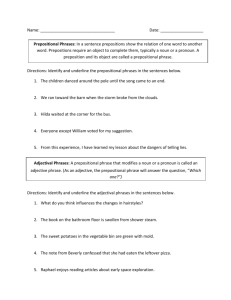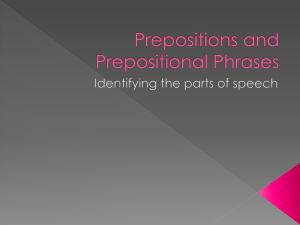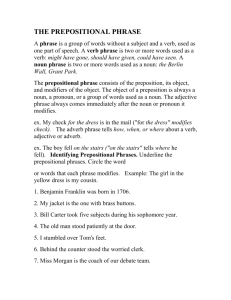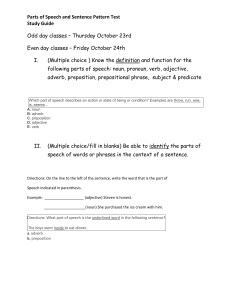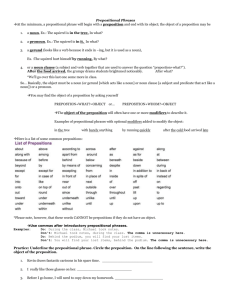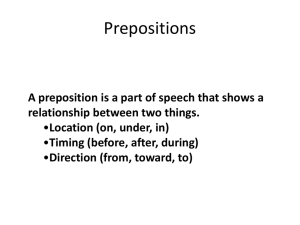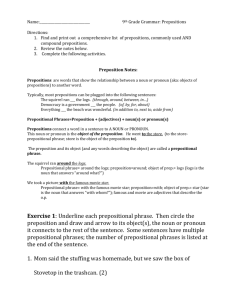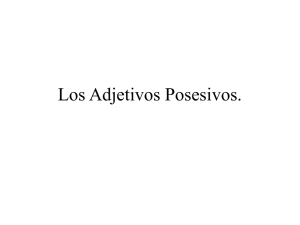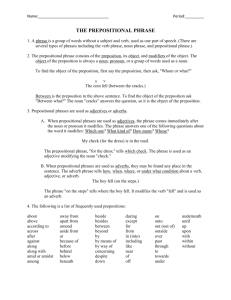Holiday Grammar Packet
advertisement
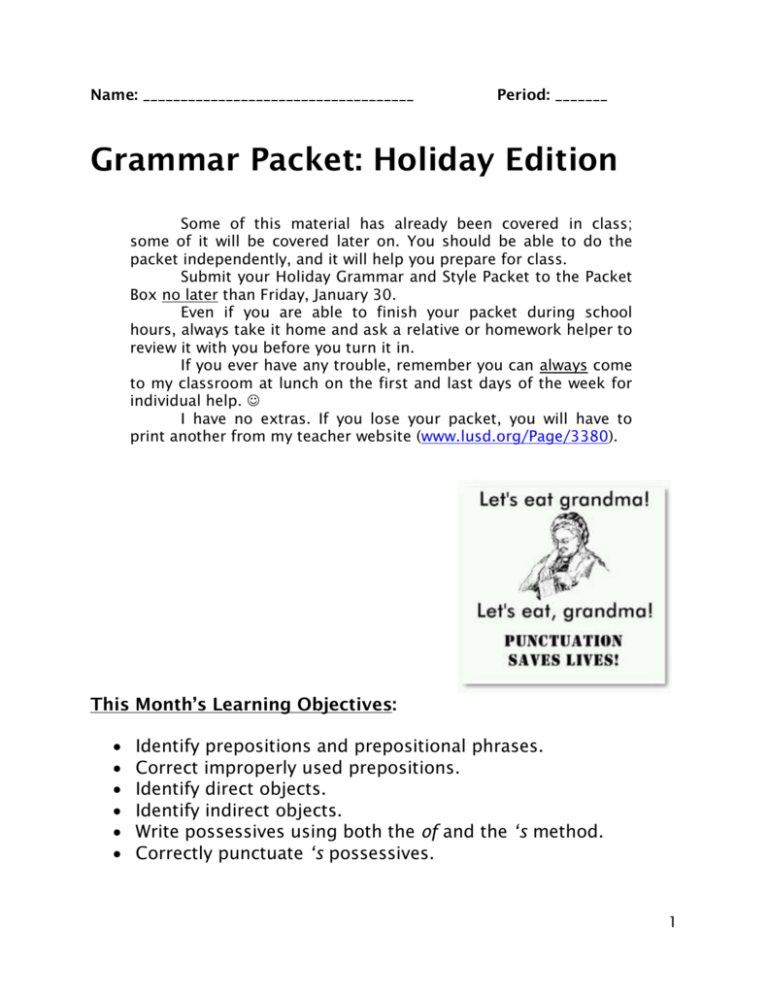
Name: ____________________________________ Period: _______ Grammar Packet: Holiday Edition Some of this material has already been covered in class; some of it will be covered later on. You should be able to do the packet independently, and it will help you prepare for class. Submit your Holiday Grammar and Style Packet to the Packet Box no later than Friday, January 30. Even if you are able to finish your packet during school hours, always take it home and ask a relative or homework helper to review it with you before you turn it in. If you ever have any trouble, remember you can always come to my classroom at lunch on the first and last days of the week for individual help. I have no extras. If you lose your packet, you will have to print another from my teacher website (www.lusd.org/Page/3380). This Month’s Learning Objectives: Identify prepositions and prepositional phrases. Correct improperly used prepositions. Identify direct objects. Identify indirect objects. Write possessives using both the of and the ‘s method. Correctly punctuate ‘s possessives. 1 Commonly Misused Phrases I. A phrase is a group of words that are used as a unit. A sentence is made up of phrases. Of course, a sentence is also a group of words. The difference between a phrase and a sentence is that a sentence must express a complete thought (in other words, it must have a subject and a predicate). Phrases don’t need to express a complete thought. It is just a group of words that are working together to express part of an idea. Sample Sentence: After the fall of the Roman empire, Western Europe is said to have fallen into a “dark age,” where knowledge of complex learning and civilization was lost. Sample Phrases: After the fall of the Roman empire, fall of the Roman empire Roman empire Western Europe is said is said to have fallen have fallen fallen into fallen into a “dark age” where knowledge of complex learning and civilization was lost complex learning and civilization knowledge of complex learning and civilization was lost II. An idiom is a phrase, sentence, or saying that is used in a particular way among a particular group of people. Idioms are not logical, yet they are “correct” for that language. You must simply learn the rules if you want your speech or writing to sound correct. III. Certain phrases are idiomatic: you can’t use every word with every single other word, in English or any other language. 2 Obviously, there are hundreds of thousands of idiomatic phrases in English. You cannot learn them all at once. However, you can start training yourself by studying the following chart and fixing the many incorrect phrases in the “Sotp!” Proofreading Exercise. You will notice that the most common mistakes are using “of” too often. Wrong Phrase Correct Phrase attention at, attention for (noun) afraid about (adjective) attention to afraid of [noun] OR afraid to [verb] amazing at, amazing in different from good at inferior to, superior to nervous about sure about adjust to excel in, excel at satisfied with report on worry about amazing of, amazing for (adj) different to (adj) good of, good on, good in (adj) inferior than/superior than (adj) nervous of (adj) sure of (adj) adjust of, adjust for (verb) excel of, excel for (v) satisfied of (v) report of, report in (v) worry of (v) Proofread the following essay. You will have to write directly on the draft to fix it. Here is a checklist: Tell the writer to indent. Draw a little arrow where she should have indented and write the message INDENT! Capitalize the beginning of each sentence and proper nouns/adjectives. Fix all misspelled words, including contractions. Use the chart above to correct misused phrases. 3 english 7 cassie Elliot Period 1 Novmeber 27 2014 “Dealing with Fear” Essay Do u no what its like when youre palms sweat and your legs get shaky? When you are scared, sometimes you cant even stand up. Its worse if you think you are inferior than everyone else in the group. Then you can get overwhelmed with terror. If you ever feel that way, I can sympathize with u. One of the things that I am the most afraid about is public speaking. some times teachers will ask us out of the blue to stand up and report in what we just read. I am good on reading, but that doesnt mean I can just talk about it without writing what I want to say first! My fifth-grade teacher used to encourage us to write our speech. That was all right, but then he started taking of points if we “read our speech.” Well then I always wanted to say “What was the point of writing it. My english teacher this year says its a part of life and I will learn to adjust for the challenge. I am not so sure of that. One aspect I get very nervous of beginging. When do i start. I like the teacher to be very clear and the other students to NOT pay perfect attention at me. In addition I get worry of what people will say afterwords. also, the teacher all ways tells me to “speak up.” I am already talking as loud as i can!! But she still all ways says I am to quiet. But you want to know whats realy wierd. Guess what i excel of. You would never guess, but I am an amazing public singer! 4 Prepositions You have already learned that nouns can be concrete (physical) or abstract (conceptual). However, that is not the end of the story. Oftentimes we want to be even more specific about what thing we are talking about. Prepositions are words that show the relationship between a noun (a thing) and the rest of the world. Prepositions are often the first word in a prepositional phrase. This is a group of words that begins with a preposition and ends in a noun: Preposition – Noun OR Preposition – Article – Noun OR Preposition – Adjective – Noun1. Here are some examples. The prepositions are in bold. The entire prepositional phrase is underlined. The food on his plate was getting cold. I trained the dog with yummy treats. The tree behind your house is her favorite. Obviously, prepositions allow us to be clearer and more specific in our writing. These are small words that nevertheless pack a lot of power! Here the 25 most common prepositions in English2: If you have already studied pronouns before this course, then bear in mind that a pronoun is simply a type of noun. Therefore, for him is also a prepositional phrase. (If you haven’t studied pronouns, don’t worry about them yet. They only confuse the issue.) 2 Source: English Club Online (https://www.englishclub.com/vocabulary/common-prepositions25.htm) 1 5 Examples of Prepositions about after against among around as at before between by during for from in into like of on out over through to under with without PRACTICE 13 In the following sentences, double-underline any preposition and underline any prepositional phrase. There may be more than one in a sentence. EXAMPLE: I am worried about the test that Mrs. Tennant is giving on Friday. 1. Zeus was the ruler of the Greek gods. 2. In 146 BCE, the Romans took over. 3. Roman religion was influenced by the Greeks. 4. Livius Andronicus, a liberated Greek slave, translated The Odyssey into Latin. 5. Cato spoke in front of the Senate about the Carthaginian war. 6. The army burned Carthage to the ground. Most sentences in these practices are taken from The Western Heritage, eds. Kagan, Ozment, and Turner. 3 6 Direct Objects 4 A direct object is a noun or noun phrase that tells who or what receives the action of the verb. EXAMPLES: I called Ryan. [Q: Who was called? A: Ryan] Swimming marathons require strength and endurance. [Q: What do the marathons require? A: strength and endurance] To find the direct object, ask the question Whom? or What? after the verb. The answer to that question is the direct object. PRACTICE 2 Underline the direct object in each sentence. EXAMPLE: During a marathon, some swimmers may lose several pounds. 1. My uncle repairs engines. 2. I met Dr. Mason. 3. Did Bill hit a home run? 4. Please buy fruit, bread, and milk. 5. A swimmer in training may swim five or six miles every day. 6. Fatigue, pain, and huge waves challenge marathon swimmers. 4 Source: Holt Handbook (74-75). 7 Indirect Objects 5 Consider this sentence: Roger passed a note in class. The direct object is obviously a note. (What did Roger pass? A note.) However, what if your question is who Roger was passing a note to? There are two ways to answer that question. 1) You can answer the question by using a prepositional phrase: Roger passed a note to Rosie in class. Now we know who Roger is passing the note to because of the prepositional phrase to Rosie (Prep – Noun). 2) The second way to answer the question is to use an indirect object. Indirect objects are nouns or noun groups. They also answer the question to whom, to what, for whom, or for what, but they do NOT use a preposition: Roger passed Rosie a note in class. This sentence is also perfectly correct. Notice that, when you use a prepositional phrase to answer to whom, you must put the phrase after the verb. If you don’t want to use a preposition and instead use a direct object, then you put the phrase before the verb. 5 Source: Holt Handbook (76-78). 8 PRACTICE 3 Rewrite the sentence so that, instead of using a prepositional phrase, you are using an indirect object: EXAMPLE: I threw the ball to Lila. I threw Lila the ball. 1. Paula left a tip for the waiter. _________________________________________________________________ 2. Marco made a card for Mr. Eppley. _________________________________________________________________ 3. I am giving my pencil to Susanna. _________________________________________________________________ 4. Her dad made dinner for us. _________________________________________________________________ PRACTICE 4 In each sentence, the direct object is already underlined. Doubleunderline the indirect object. EXAMPLE: Will you please save Ricardo and Juliana a seat? Will you please save Ricardo and Juliana a seat? 1. I found us seats near the stage. 2. I’ll gladly lend you my new CD. 3. I fed the horse and the mule some hay and oats. 4. Mai told the children stories about her family’s escape from Vietnam. 9 PRACTICE 5 Underline the direct object. Double-underline the indirect object. EXAMPLE: The ship’s captain gave the crew orders. The ship’s captain gave the crew orders. 1. Vinnie made us some lasagna. 2. They owe you and me an apology. 3. The performers showed visitors authentic costumes and food. 4. My secret pal sent me a birthday card. 5. The Nobel Foundation awarded Octavio Paz the Nobel Prize in Literature. Possessives Of is a special preposition. It has many uses. One of its uses is that it can form phrases that show possession: The wealth of Mrs. McGintley is incredible. In that sentence, the prepositional phrase of Mrs. McGintley shows us who the wealth belongs to (which is another way of saying who possesses the wealth). Of course, this sentence sounds very old-fashioned and awkward. The more common way to say it is to use a possessive: Mrs. McGintley’s wealth is incredible. 10 The possessive case means that a noun is written so as to show that it is the owner of another noun. It can be either singular or plural.6 The singular possessive is used when the possessive noun refers to a single person, a single place, a single thing, etc. It is formed by adding ‘s to the noun: Kathleen’s desk (the desk of Kathleen) the mailman’s bag (the bag of the mailman) an hour’s time (the time of an hour) anybody’s guess (the guess of anybody) The plural possessive is used when the possessive noun refers to more than one people, places, things, etc. the girls’ locker room (the locker room of the girls) the boys’ gym (the gym of the boys) the deer’s frightened eyes (the frightened eyes of the deer) There are two ways to form a plural possessive: 1) If the plural noun ends in s: add ‘ (just an apostrophe) 2) If the plural end does NOT end in s: add ‘s (same as singular possessive) PRACTICE 6 Rewrite the phrase with a noun in the possessive case. EXAMPLE: the games of the children the children’s games 1. the dance of fairies _______________________________________ 2. the daughter of the prince ________________________________ 3. the hoodie of the boy _____________________________________ 4. the mirror of Suyin _______________________________________ 6 Source for pages 11-12: Holt Handbook (330-331) 11 PRACTICE 7 Identify the word that needs an apostrophe in each of the following sentences. Then, write that word with correct punctuation. EXAMPLE: The babys cries are very annoying. baby’s 1. The Prado in Madrid, Spain is one of the worlds greatest museums. _________________________________ 2. Shown on the next page is one of the Prados paintings by Diego Velazquez, Las Meninas. _________________________________ 3. Velazquezs painting is known in English as The Maids of Honor. _________________________________ 4. The maids dresses are even more imposing than that of the bride. _________________________________ 5. To the princesss right, a kneeling maid of honor offers her something to drink. _________________________________ 6. In most experts opinion, this painting marks the height of the Golden Age of Spanish art. _________________________________ 12 Write It! This Month’s Challenge: Your teachers are looking for you to correctly use the possessive case at least 3 times in this month’s writing. Suggested Topic: Make up the name of four characters who share the same room. Use one of the characters as a first-person narrator. (S)he will complain, at length, about how his/her siblings leave such a mess in their room: Fictional Siblings: __________________________ __________________________ __________________________ __________________________ (HINTS: Whose dresser is always blocking the bookcase? Whose shoes are you always tripping over because they are left on the floor? Whose bunk is the top bunk; whose bunk is the bottom? Whose clothes hangers are scattered everywhere? Whose books take up too much room? Who always leaves a mess for someone else to clean? Who always tells you to be more organized, and then leaves her own pillow covered in crumbs?) 13 __________________________________________________________ __________________________________________________________ __________________________________________________________ __________________________________________________________ __________________________________________________________ __________________________________________________________ __________________________________________________________ __________________________________________________________ __________________________________________________________ __________________________________________________________ __________________________________________________________ __________________________________________________________ __________________________________________________________ __________________________________________________________ __________________________________________________________ __________________________________________________________ __________________________________________________________ __________________________________________________________ 14 __________________________________________________________ __________________________________________________________ __________________________________________________________ __________________________________________________________ __________________________________________________________ __________________________________________________________ __________________________________________________________ __________________________________________________________ __________________________________________________________ __________________________________________________________ __________________________________________________________ Proofread! ** Indent your paragraph. ** Make sure your paragraph is at least 8 sentences and enjoyable to read. ** Capitalize each sentence and all proper nouns and adjectives. ** Make sure you have correct end-punctuation. ** Look up the spelling of words you are unsure of. ** Make sure you used correct punctuation with any interjections. ** Make sure you used 3 possessives correctly. ** Fix ANYTHING you know how to fix. 15 The page numbers cite pages on which you should have written something, so that you can check to make sure you did not skip an exercise. You may have to flip back before the exercise in order to read the lesson or the full instructions for the exercise. Grading Rubric: “Sotp!” Proofreading Exercise (p. 4): _____/15 Practice #1 (p. 6) _____/6 Practice #2 (p. 7) _____/6 Practice #3 (p. 9) _____/4 Practice #4 (p. 9) _____/4 Practice #5 (p. 10) _____/5 Practice #6 (p.11) _____/4 Practice #7 (p. 12) _____/6 Write It! Followed Directions (p. 14-15 ) _____/10 Did you correctly use: at least 3 words in the possessive case? Write It! Proofreading and Effort (p. 14-15 ) _____/10 Total _____/70 16
